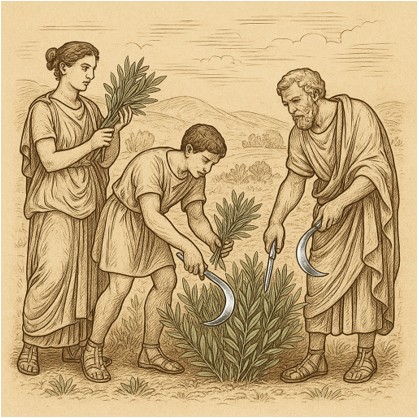| Reader, Imagine a healing herb that is so revered, you could only harvest it during a special ceremony.
That's how sacred sage was to the ancient Romans.
Before gathering it, they had to change into clean clothing and wash their feet. They even swapped their everyday iron tools with ones made of silver in order to avoid "contaminating" the plant.  The ancient Romans revered the herb sage. In fact, the word "sage" comes from the Latin salvia, which means "to heal" or "to save." | They believed those who drank it never grew old. So they nicknamed it the "holy herb of immortality."
Their appreciation makes sense, although they may not have known why.
But today research proves the incredible health benefits of this plant – including the way it can lower blood sugar levels in patients with diabetes.
In one study, sage extract was found to lower blood glucose levels in animals with type 1 diabetes by activating a specific receptor called PPARγ.
When this receptor is activated, it can help remove excess free fatty acids in the blood, which in turn, improves insulin sensitivity.1
A second study, this time in mice with type 2 diabetes, found that sage tea is as effective as Big Pharma's drug Metformin in balancing blood sugar.2
And a 2018 animal study found sage lowered blood sugar as well as the diabetes drug Avandia.
Human research has even more positive benefits.
In a clinical trial of 40 people with diabetes, researchers gave participants sage leaf extract daily for three months. By the end of the trial, the patients had lower fasting glucose, lower average glucose levels, and lower triglycerides.3
But sage does much more than balance your blood sugar. It also: - Protects against Alzheimer's. Sage stops the breakdown of a chemical messenger called acetylcholine.4 This neurotransmitter is directly involved in memory and levels fall as Alzheimer's progresses. The herb has also been shown to improve memory in older adults by up to 60%.5
- Fights certain kinds of cancer. Studies found sage extract can suppress the growth of cancer cells and stimulate apoptosis, or cell death, in colon, liver, breast, and skin.6
- Supports bone health. Sage contains a large amount of bone-boosting vitamin K. Too little of this nutrient is linked to bone thinning and fractures.
- Lowers inflammation. Sage is high in rosmarinic acid (RosA), a powerful anti-inflammatory. A 2020 study found RosA can significantly reduce arthritis pain, improve breathing in asthma patients, lower inflammation of the colon, and relieve pancreatitis.7
- Ease menopause symptoms. Sage has been used to treat menopause symptoms for hundreds of years. Modern science found using sage daily significantly reduced the number and intensity of hot flashes over eight weeks.8
- Improve oral health. The herb has antimicrobial properties that can help reduce dental plaque and kill cavity-causing bacteria such as Streptococcus mutans. Sage-based mouthwashes have been shown to be effective in improving oral hygiene and reducing plaque.9
Brew A Cup Of Healthy Sage Tea I love adding sage to my recipes. It's especially good with lamb.
But one of the easiest ways to get the incredible health benefits of sage is by making a tea. It's fast, easy, and earthy. I like adding a bit of organic honey and lemon to mine. Ingredients: - 1 Tbsp fresh sage leaves, or 1 tsp dried sage
- 1 cup of water
- 1 lemon wedge
- honey to taste
Directions: - Bring water to a boil in a small pan
- Remove from heat and add sage.
- Let steep for 5 minutes.
- Strain into a cup, add lemon and honey, and enjoy.
Note: Don't drink more than 5 cups of sage tea a day.
Of course, you can also supplement. I suggest taking 500 mg three times a day.
To Your Good Health, 
Al Sears, MD, CNS
References: - Christensen K, et al. "Activation of the nuclear receptor PPARγ by metabolites isolated from sage (Salvia officinalis L.)" J Ethnopharmacol. 2010 Oct 28;132(1):127-33.
- Lima C, et al. "Metformin-like effect of Salvia officinalis (common sage): is it useful in diabetes prevention?" Br J Nutr. 2006 Aug;96(2):326-33.
- Kianbakht S and Dabaghain F. "Improved glycemic control and lipid profile in hyperlipidemic type 2 diabetic patients consuming Salvia officinalis L. leaf extract: a randomized placebo. Controlled clinical trial." Complement Ther Med. 2013 Oct;21(5):441-6.
- Akhondzadeh S, et al. "Salvia officinalis extract in the treatment of patients with mild to moderate Alzheimer's disease: a double blind, randomized and placebo-controlled trial." J Clin Pharm Ther. 2003 Feb;28(1):53-9.
- Scholey AB, Tildesley NT, Ballard CG, et al. An extract of Salvia (sage) with anticholinesterase properties improves memory and attention in healthy older volunteers. Psychopharmacology (Berl). 2008 May;198(1):127-39.
- "Medicinal Property of Sage (Saliva) for Curing Illnesses...and Cancer." Accessed on July 2, 2025.
- Luo C, et al. "A review of the anti-inflammatory effects of rosmarinic acid on inflammatory diseases." Front Pharmacol. 2020; 11:153.
- Bommer S, et al. "First time proof of sage's tolerability and efficacy in menopausal women with hot flushes." Adv Ther. 2011 Jun;28(6):490-500.
- Rouy M, et al. "The antibacterial effect of sage extract (Salvia officinalis) mouthwash against Streptococcus mutans in dental plaque: a randomized clinical trial." Iran J Microbiol. 2015 Jun;7(3):173-7.
|
No comments:
Post a Comment